The increasing application of modern technologies, such as XR and simulations, and advanced educational settings calls for radical new assessment, feedback and guidance concepts. This talk explores smart, automated and flexible assessment approaches for engineering education. It focusses on competence and skill assessment as well as immediate feedback and guidance, both for individual learners and instructors.
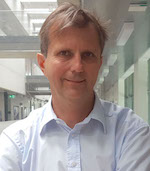 Christian Guetl holds a Ph.D. in Computer Science from Graz University of Technology (TUG) and has received the “venia legendi” for applied computer science in 2009. He is at the Institute of Interactive Systems and Data Science at TUG in Graz, Austria, where he leads the Cognitive and Digital Science (CoDiS) Lab. Christian is involved in e-learning and e-assessment for more than 20 years and he has authored and coauthored in more than 220 peer-reviewed book chapters, journals, and conference proceedings publications. He is involved in numerous organizational and editorial boards as well as program committees. He is founding member of the global Immersive Learning Research Network (iLRN), chair of the technical committee of immersive learning (ILE-TC) of IEEE Education Society, managing editor of J.UCS, coeditor of the International Journal of Knowledge and Learning (IJKL). His research interests include information search and retrieval, e-education, e-assessment, adaptive media technologies, and virtual and augmented reality for learning and knowledge transfer.
Christian Guetl holds a Ph.D. in Computer Science from Graz University of Technology (TUG) and has received the “venia legendi” for applied computer science in 2009. He is at the Institute of Interactive Systems and Data Science at TUG in Graz, Austria, where he leads the Cognitive and Digital Science (CoDiS) Lab. Christian is involved in e-learning and e-assessment for more than 20 years and he has authored and coauthored in more than 220 peer-reviewed book chapters, journals, and conference proceedings publications. He is involved in numerous organizational and editorial boards as well as program committees. He is founding member of the global Immersive Learning Research Network (iLRN), chair of the technical committee of immersive learning (ILE-TC) of IEEE Education Society, managing editor of J.UCS, coeditor of the International Journal of Knowledge and Learning (IJKL). His research interests include information search and retrieval, e-education, e-assessment, adaptive media technologies, and virtual and augmented reality for learning and knowledge transfer.
This presentation will explain our work on a database of information about historical monuments in Cairo, as an example of a platform for data-driven research. Experts in architectural history typically deal with a variety of data types in conducting their research. There are photographs of historical buildings, graphics data such as diagrams and floorplans of buildings, map data to show the locations of buildings, meta-data tags to provide additional information about buildings, text data from primary and secondary sources, and so on. These data are stored in a variety of formats, such as on paper, in Excel spreadsheets, and on camera film. In most cases, only the researcher themself is in possession of the materials and knows how they are being used. When that researcher retires or passes away, that trove of hard-earned data sits unused, or even worse, is discarded. Passing valuable data on to the next generation of researchers is presumably a challenge in any country, but particularly so in Japan with its graying demographics and declining student population.
As an experiment, we have begun to organize some of our own data into a Database of Historical Monuments in Islamic Cairo, creating a platform that allows us to pass our acquired data on to subsequent generations while also allowing further expansion. The goal of this collaboration of geoinformatics, humanities, and history experts is to produce a digital platform with a diversity of data in a variety of formats, all brought together in a shared database for easy access. The platform doesn’t simply hold the data, it allows the data to be used for education and to stimulate new research. This presentation will explain about our implementation of this platform, touching on our use of the GIS and IIIF formats, the possibilities of virtual reality, and using machine learning AI to create meta-data tags.
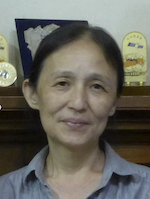 Naoko FUKAMI (深見奈緒子) is Director, Japan Society for the Promotion of Science Promotion Society (JSPS) Cairo since 2015 and engaged in a project of Revitalization and Sustainability of Communities in Historic Cairo supported by TOYOTA Fund from 2016 to 2018. She obtained her M.Sc from Tokyo Metropolitan University in 1981 about Islamic Architecture in Deccan from the 14th to 17th century, and Ph.D from Yokohama National University in 1998 about Muqarnas, its origin and development. She was a Visiting Professor Institute of Oriental Culture, University of Tokyo from 1999 to 2001making the Digital Archive: by the Mission for Indian History and Archaeology, University of Tokyo in 1959-1962. She was a Professor, Organization for Islamic Area Studies, Waseda University from 2011 to 2014, she joined the project of Islam and Multiculturalism. Her articles are ‘Bhadreshwar, from the Medieval Port City to Modern Village, Gujarat, India’, Islam and Multiculturalism” JSPS Core-to-Core Program, pp.62-74, 2016 and ‘The Use of Muqarnas in the Transitional Zone of Domes in Egyptian Islamic Architecture: From the Fatimid to the End of the Mamluk Era’, ORIENT, Volume 52, pp.93–120, 2017, Her books are the World of Islamic Architecture, Kodansha Genndai-Shinsho, 2005, Global history in Islamic Architecture, Iwanami Shoten, 2013, and Beautiful Mosques from the World, X-Knowledge, 2016 etc.
Naoko FUKAMI (深見奈緒子) is Director, Japan Society for the Promotion of Science Promotion Society (JSPS) Cairo since 2015 and engaged in a project of Revitalization and Sustainability of Communities in Historic Cairo supported by TOYOTA Fund from 2016 to 2018. She obtained her M.Sc from Tokyo Metropolitan University in 1981 about Islamic Architecture in Deccan from the 14th to 17th century, and Ph.D from Yokohama National University in 1998 about Muqarnas, its origin and development. She was a Visiting Professor Institute of Oriental Culture, University of Tokyo from 1999 to 2001making the Digital Archive: by the Mission for Indian History and Archaeology, University of Tokyo in 1959-1962. She was a Professor, Organization for Islamic Area Studies, Waseda University from 2011 to 2014, she joined the project of Islam and Multiculturalism. Her articles are ‘Bhadreshwar, from the Medieval Port City to Modern Village, Gujarat, India’, Islam and Multiculturalism” JSPS Core-to-Core Program, pp.62-74, 2016 and ‘The Use of Muqarnas in the Transitional Zone of Domes in Egyptian Islamic Architecture: From the Fatimid to the End of the Mamluk Era’, ORIENT, Volume 52, pp.93–120, 2017, Her books are the World of Islamic Architecture, Kodansha Genndai-Shinsho, 2005, Global history in Islamic Architecture, Iwanami Shoten, 2013, and Beautiful Mosques from the World, X-Knowledge, 2016 etc.
The last several years have witnessed major advancements in the development of sensor technologies and wearable devices with the goal of collecting various types of data in many application domains. Based on such technologies, many commercial products have swamped the market and found their way on the wrists, ancles and belts of many users. Although these developments are certainly welcomed, so much left to be done to take full advantage of the data gathered by such devices. The most critical missing component is the lack of advanced data analytics. In the case of health monitoring, like many aspects of healthcare, the focus has been primarily on producing devices with data collection capabilities rather than developing advanced models for analyzing the available data.
In this talk, we attempt to fill this gap by presenting new data analytics tools that connect mobility and heath. We utilize graph modeling and complex networks along with how to effectively employ population-based approaches in implementing such tools. We demonstrate how the proposed tools can be applied to analyze big mobility data and reveal new useful health-related features in several case studies. We also utilize graph-theoretic mechanisms to zoom in and out of network models and extract different types of information at various granularity levels. The proposed approach paves the way towards a new decision support system that leads to new discoveries in Biomedical research and healthcare applications.
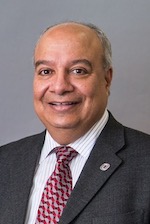 Hesham H. Ali is a Professor of Computer Science and the director of the University of Nebraska Omaha (UNO) Bioinformatics Core Facility. He served as the Lee and Wilma Seemann Distinguished Dean of the College of Information Science and Technology at UNO between 2006 and 2021. He has published numerous articles in various IT areas including scheduling, distributed systems, data analytics, wireless networks, and Bioinformatics. He has published two books in scheduling and graph algorithms, and several book chapters in Bioinformatics. He has been serving as the PI or Co-PI of several projects funded by NSF, NIH and Nebraska Research Initiative in the areas of data analytics, wireless networks and Bioinformatics. He has also been leading a Research Group that focuses on developing innovative computational approaches to model complex biomedical systems and analyze big bioinformatics data. The research group is currently developing several next generation big data analytics tools for analyzing large heterogeneous biological and health data associated with various biomedical research areas, particularly projects associated with infectious diseases, microbiome studies, early childhood development and aging research. He has led several local and national outreach initiatives including Women in IT initiatives, IT education and training programs, and IT summer internship camps.
Hesham H. Ali is a Professor of Computer Science and the director of the University of Nebraska Omaha (UNO) Bioinformatics Core Facility. He served as the Lee and Wilma Seemann Distinguished Dean of the College of Information Science and Technology at UNO between 2006 and 2021. He has published numerous articles in various IT areas including scheduling, distributed systems, data analytics, wireless networks, and Bioinformatics. He has published two books in scheduling and graph algorithms, and several book chapters in Bioinformatics. He has been serving as the PI or Co-PI of several projects funded by NSF, NIH and Nebraska Research Initiative in the areas of data analytics, wireless networks and Bioinformatics. He has also been leading a Research Group that focuses on developing innovative computational approaches to model complex biomedical systems and analyze big bioinformatics data. The research group is currently developing several next generation big data analytics tools for analyzing large heterogeneous biological and health data associated with various biomedical research areas, particularly projects associated with infectious diseases, microbiome studies, early childhood development and aging research. He has led several local and national outreach initiatives including Women in IT initiatives, IT education and training programs, and IT summer internship camps.
Recent robotics, automation and sensing endeavors are making it into the mainstream. This talk will highlight several recent research and development projects with in the areas of designing hybrid controllers for robotics and automation applications, service robots, prototyping and synthesis of controllers, simulators, and monitors for manipulators and autonomous mobile platforms, algorithms for uncertainty computation from sense data, and web-based prototyping, control synthesis, and simulation of robotic agents.
Several innovations and breakthroughs in Robotics, Intelligent Sensing and Control at Lawrence Technological University will be detailed. Research projects on developing and implementing theoretical and experimental tools to aid performing adaptive goal-directed robotic sensing for modeling, observing and controlling interactive agents and electromechanical systems in unstructured environments will be discussed.
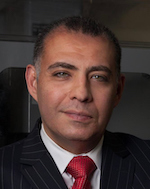 Professor Tarek M. Sobh received the B.Sc. in Engineering degree with honors in Computer Science and Automatic Control from the Faculty of Engineering, Alexandria University, Egypt in 1988, and M.S. and Ph.D. degrees in Computer and Information Science from the School of Engineering, University of Pennsylvania in 1989 and 1991, respectively. He served as Provost in 2021 and he is now the President and a Professor of Electrical and Computer Engineering at Lawrence Technological University, Michigan. He is Distinguished Professor and Dean of Engineering Emeritus at the University of Bridgeport, Connecticut.
Professor Tarek M. Sobh received the B.Sc. in Engineering degree with honors in Computer Science and Automatic Control from the Faculty of Engineering, Alexandria University, Egypt in 1988, and M.S. and Ph.D. degrees in Computer and Information Science from the School of Engineering, University of Pennsylvania in 1989 and 1991, respectively. He served as Provost in 2021 and he is now the President and a Professor of Electrical and Computer Engineering at Lawrence Technological University, Michigan. He is Distinguished Professor and Dean of Engineering Emeritus at the University of Bridgeport, Connecticut.
He served as the University of Bridgeport (UB) Executive Vice President, Research and Economic Development, and the Founding Dean of the College of Engineering, Business, and Education (2018-2020), Interim Provost (2020), and Distinguished Professor of Engineering and Computer Science (2010-2020). He was the Founding Director of the Interdisciplinary Robotics, Intelligent Sensing, and Control (RISC) laboratory (1995-2020), the Founder of the High-Tech Business Incubator at UB (CTech IncUBator) (2010-2011), and the Founding Director of the UB Innovation Center (2019-2020). He was the Senior Vice President for Graduate Studies and Research (2014-2018), Vice President (2008-2014), Vice Provost (2006-2008), Dean of the School of Engineering (1999-2018), Interim Dean of the School of Business, Director of External Engineering Programs, Interim Chair of Computer Science and Computer Engineering, and Chair of the Department of Technology Management. He was a Professor of Computer, Electrical and Mechanical Engineering and Computer Science (2000-2010), an Associate Professor of Computer Science and Computer Engineering at the University of Bridgeport (1995-1999), a Research Assistant Professor of Computer Science at the Department of Computer Science, University of Utah (1992-1995), and a Research Fellow at the General Robotics and Active Sensory Perception (GRASP) Laboratory of the University of Pennsylvania from (1989-1991).
His background is in the fields of computer science and engineering, STEM Education, control theory, robotics, automation, manufacturing, AI, computer vision and signal processing. He has published over 275 refereed journal and conference papers, and book chapters in these and other areas, in addition to 27 books. Dr. Sobh served or currently serves on the editorial boards of 18 journals, and has served as Chair, Technical Program Chair and on the program committees of over 300 international conferences and workshops in the Robotics, Computer Vision, Automation, Sensing, Computing, Systems, Control, Online Engineering and Engineering Education areas. He has presented more than 150 keynote speeches, invited talks and lectures, colloquia and seminars at research meetings, University departments, research centers, and companies.
Professor Sobh has supervised over 50 award-winning graduate and undergraduate students working on different projects within robotics, prototyping, computer vision, control, and manufacturing; in addition to more than 300 undergraduate and graduate students working on their B.S. projects, Master's thesis or Ph.D. dissertations. Dr. Sobh is active in consulting and providing service to many industrial organizations and companies. He has consulted for several companies in the U.S., Switzerland, India, Malaysia, England, the United Arab Emirates, Kazakhstan and Egypt, to support projects in higher education, robotics, automation, manufacturing, sensing, and control. He has also worked at Philips Laboratories in New York, and a number of companies in Egypt. Dr. Sobh has been awarded over 60 research awards and grants to pursue his work in robotics, automation, STEM education, manufacturing, and sensing. Dr. Sobh is a Fellow of the African Academy of Sciences and a member of the Connecticut Academy of Science and Engineering. Dr. Sobh is a recipient of the ASEE Northeastern U.S. Distinguished Engineering Professor of the Year award, the IEEE Northeast Technological Innovation Research Award, an ACE Higher Education Award and several other merits in recognition of his educational, research, scholarly and service activities in engineering, education, computing and diversity initiatives. Dr. Sobh is a Licensed Professional Electrical Engineer (P.E.), a Certified Manufacturing Engineer (CMfgE) by the Society of Manufacturing Engineers, a Certified Professional Manager (C.M.) by the Institute of Certified Professional Managers at James Madison University, a Certified Reliability Engineer (C.R.E.) by the American Society for Quality, a member of Tau Beta Pi (Engineering Honor Society), Sigma Xi (Scientific Research Society), Phi Beta Delta (International Honor Society), Upsilon Pi Epsilon (National Honor Society for the Computing Sciences), Phi Kappa Phi (Academic Honor Society) and an honorary member of Delta Mu Delta (National Honor Society for Business Administration). Dr. Sobh is a member, senior member, founding or board member of several professional organizations including; ACM, IEEE, the International Society for Optical Engineering (SPIE), the National Society of Professional Engineers (NSPE), the American Society of Engineering Education (ASEE), the American Association for the Advancement of Science (AAAS), the Society of Manufacturing Engineers (SME), the International Association of Online Engineering (IAOE), the Bridgeport Discovery Museum, the Connecticut Pre-Engineering Program (CPEP), and the International E-Learning Association (IELA). Dr. Sobh is a graduate of Victoria College, Alexandria, Egypt, in 1983 and a life member of the Old Victorians Association.
The talk will focus on reviewing the challenges and Issues of Society 5.0 which could impact users' acceptance. Often, Technology Acceptance Model (TAM) has been used extensively to explain and predict users' acceptance of new innovation. With the advancement in Society 5.0's services, it is important to make those new services more available and accessible to citizens in order to increase their trust. One solution to associate citizen is that government utilizes TAM to design and promote implementation society 5.0 according to local and regional constraints.
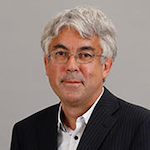 Dr. Hdr. Frederic Andres received his Ph.D. in Information Systems from the University of Paris VI ”Pierre et Marie Curie”in 1993 and his Dr. Habilitation in Informatics from the University of Nantes in 2000. Dr.Frederic Andres has been associate professor in the Digital Content and Media Sciences Research Division of the National Institute of Informatics (NII) in Tokyo, Japan since 2000 and of Sokendai (Tokyo) since 2002. He is author of more than 150 papers on international journals, books and conferences. His main research areas of interest include several topics such as collective intelligence-based community management, early stress detection and management, pedagogy and didactical web-based science education for all, intelligent cooking recipe computing and water crystal computing. He has been co-organising the International DECOR workshop in conjunction of ICDE2018@Paris,ICDE2019@Macau, ICDE2020@Dallas, ICDE2021@Chania and ICDE2022@Kuala Lumpur. His team won the 1st prize in IEEE Brain Data Bank Challenges and Competitions on COMPSAC 2018, July 2018.
Dr. Hdr. Frederic Andres received his Ph.D. in Information Systems from the University of Paris VI ”Pierre et Marie Curie”in 1993 and his Dr. Habilitation in Informatics from the University of Nantes in 2000. Dr.Frederic Andres has been associate professor in the Digital Content and Media Sciences Research Division of the National Institute of Informatics (NII) in Tokyo, Japan since 2000 and of Sokendai (Tokyo) since 2002. He is author of more than 150 papers on international journals, books and conferences. His main research areas of interest include several topics such as collective intelligence-based community management, early stress detection and management, pedagogy and didactical web-based science education for all, intelligent cooking recipe computing and water crystal computing. He has been co-organising the International DECOR workshop in conjunction of ICDE2018@Paris,ICDE2019@Macau, ICDE2020@Dallas, ICDE2021@Chania and ICDE2022@Kuala Lumpur. His team won the 1st prize in IEEE Brain Data Bank Challenges and Competitions on COMPSAC 2018, July 2018.
| 27 Sep 2021 | Submissions for GOLC Online Lab Award 2022 |
| 22 Oct 2021 | Submission of structured abstracts for full and short papers; Submission of proposals for special sessions |
| 01 Nov 2021 | Invitation to submit a full paper or short paper |
| 22 Nov 2021 | Submission deadline for complete full and short papers, Work in Progress, Poster, Round Table/Panel Sessions, Workshops, Special session papers |
| 13 Dec 2021 | Notification of Acceptance |
| 03 Jan 2022 | Camera-ready upload open |
| 17 Jan 2022 | Author registration Camera-ready due |
| 28 Feb 2022 | Conference Opening |